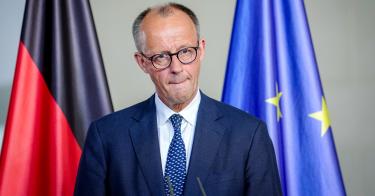Germany’s Christian Democratic Union (CDU) and its sister party, the Christian Social Union (CSU)—collectively known as the Union—took power after securing the largest block of votes in parliamentary elections. The CDU won based on a reputation for conservatism.
The Union promised voters it would walk back the left’s disastrous green energy agenda, which was destroying Germany’s industrial base and the jobs it generated. Yet, even before taking office, Germany’s conservative leaders reneged on their pledge.
Founded in 1945 as an interdenominational Christian political party, the CDU was anti-communist, socially conservative, pro-American, pro-Europe, and pro-free enterprise. Its Bavarian affiliate, the CSU, has always been considered the more conservative of the two parties.
In recent years, however, the Union underwent a striking transformation, forging an unlikely alliance with leftwing green energy elites. While the outgoing Socialist-Green government bears much blame for Germany’s soaring energy prices, the crisis traces back to decisions made by CDU’s previous Chancellor, Angela Merkel.
Green Chancellor Merkel
Before the 2009 elections, Merkel called the left’s phasing out of nuclear power “absolutely wrong” and pledged to reverse her Socialist predecessor’s program, touting nuclear as a clean, reliable energy source. However, after Japan’s Fukushima nuclear plant disaster in 2011, she bowed to anti-nuclear sentiment and committed to closing all nuclear plants by 2022. These plants provided 22% of the nation’s electricity, leaving Germany with one of Europe’s highest energy bills.
>>> America’s Electric Car Crash Is Over. Europe Has Finally Noticed
The cost of Germany’s transition to renewable energy sources, such as wind and solar, was projected to exceed a staggering €1.5 trillion. Merkel classified climate change as an existential threat and rebranded herself the “Green Chancellor.” She poured billions in subsidies into green energy projects. The party that once championed free markets became the party of massive government intervention in the economy.
Merkel undercut the basis of Germany’s manufacturing-based export economy: cheap energy. Germany relied on cheap Russian gas to offset the inconsistent output of renewables, even after invading Ukraine in 2014. That decision exacerbated tensions with the last Trump administration, which flagged it as a national security risk. The United States Congress went so far as to impose sanctions legislation on Germany.
Despite efforts to appease the left on climate, the CDU-CSU Union lost to a Socialist-Green coalition in the 2021 elections. The new government shut down the last operating nuclear power plant just as Russia launched a second and more devastating attack on Ukraine. Under intense pressure, Germany finally ended Russian gas imports financing its war machine.
Germany’s Green Strategy Issues
The fallout of Germany’s green strategy has been catastrophic. Entire towns were razed to accommodate new pit mines to fuel new coal-fired power plants. Ironically, it became necessary for Germany to import expensive nuclear energy from France and construct costly new energy infrastructure to import non-Russian gas.
In its second year of recession, Germany faces a stalled economy with projected GDP growth of just 0.7 percent this year. Since 2017, the German economy has grown by a mere 1.6 percent, compared to the EU average of 9.5 percent. Last year, Germany lost 120,000 manufacturing jobs.
Days before this year’s election, CDU-CSU Union’s candidate for Chancellor Friedrich Merz declared, “The left is finished. There’s no longer a left-wing majority or left-wing politics in Germany.” He promised to restore common-sense policies for the silent majority who “haven’t lost their marbles”—rather than catering to “green and left-wing nutcases.” He initiated coalition talks with the Social Democrats (SPD).
During negotiations, the Union, Social Democrats, and Greens agreed to break the constitutionally set debt ceiling, meeting the required two-thirds vote in Parliament. Days earlier, the CDU’s party program had affirmed a “clear commitment to the debt brake” as a matter of “intergenerational justice.” Mr. Merz declared, “It is out of the question that we will reform the debt brake in the near future.” He did, and subsequently breached a core Union conservative value.
>>> The United States Is at Risk of a Spanish-Style Electricity Meltdown
As part of the deal, Mr. Merz established a €500 billion special fund to finance investments in infrastructure and achieve climate neutrality by 2045. €100 billion had already been allocated to the Climate and Transformation Fund. Experts warned that the courts could use the fund’s wording to mandate that all projects financed by the fund (e.g., highway renovation) meet its climate goals. Others warned that climate NGOs could seek a Constitutional Court ruling to mandate climate neutrality on all industrial projects.
The political backlash against the new Chancellor has been severe. Party members are abandoning the party. A local CDU chapter has nearly entirely resigned, citing the inclusion of climate neutrality as “the straw that broke the camel’s back.”
A national television broadcaster ZDF poll found that 73 percent of respondents, including 44 percent of Union supporters, believe Merz deceived his voters. Only 32 percent said they would approve of his chancellorship, while 60 percent said they would not support him.
Rather than reverse the destructive green policies that have hobbled Germany’s economy, the Union has again made a Faustian bargain with the left by embracing the green agenda. This will further weaken Europe’s economic engine and deepen Germany’s energy renewal reliance on Communist China to the disadvantage of the United States.
This piece originally appeared in 1945




